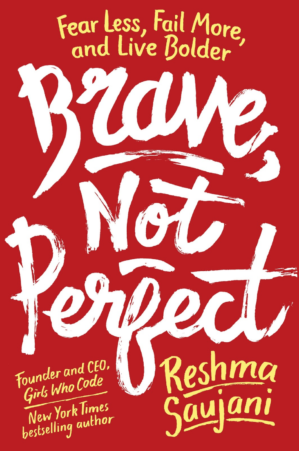The well-documented gender gap in computer sciences and technology has remained stubbornly resistant to closing. In this episode of Mastering Innovation on SiriusXM Channel 132, Business Radio Powered by The Wharton School, Reshma Saujani, Founder & CEO of Girls Who Code and author of the new book Brave, Not Perfect: Fear Less, Fail More, and Live Bolder, explains why she believes that teaching girls to be brave, not perfect, can help women make strides in fields where they’re underrepresented.
Saujani began Girls Who Code so that the careers in tech would be accessible regardless of gender. Beyond teaching computer science, the nonprofit helps girls develop a wider computational thinking and problem-solving mindset as well as soft skills like bravery. In her work, Saujani discovered that women often talk themselves out of opportunities that involve too much risk or for which they do not feel qualified, simply because a need for perfection has been ingrained in them. According to Saujani, men will apply for a job if they meet 60% of the qualifications, but for women, that threshold is 100%. By teaching young women bravery, Saujani believes they will set themselves up for success more often and experience more joy, refuting the notion that we must be perfect and good at something in order to be happy.
An excerpt of the interview is transcribed below. Listen to more episodes here.
Transcript

Nicolaj Siggelkow: Tell us a bit about being Brave, Not Perfect.
Reshma Saujani: I think girls are raised to be perfect, and boys are raised to be brave. From a young age, we tell our girls to smile pretty or play it safe. We tell our boys, “Crawl to the top of the monkey bars, and just jump.” Girls start getting addicted to perfection because that’s what people tell us we’re good at. We start thinking with a fixed mindset: we’re either good at things or bad at things. You see this at university when girls sign up for their major. If they get a B instead of an A in an introductory class, they’ll drop out, while boys will think, “I got a B. That’s amazing.”
What perfectionism is essentially doing is, one, it’s making people unhappy. Women are twice as depressed as men are. They’re not having that joy in their life. They think that if they were perfect, they would be happy. They’re realizing that they’re not, and it’s creating anxiety. Two, it’s creating a leadership gap. We only have 25% of women in Congress. We have no female Fortune 500 CEOs today – none. Even though it’s never been a better time to be a woman, – and we’re seeing bravery on the biggest stage, whether it’s four women running for president or the #MeToo movement – what we really need to inspire is everyday bravery. The bravery when you’re walking down the street and someone bumps into you to not say, “I’m sorry,” even though he pushed you. The bravery to walk away from that job that you feel “urgh” about. I want to encourage women to have everyday bravery, to not have regrets in their life, to not see other people do the things that they should have done, to pursue their biggest, boldest, wildest dream. I think that this is something we can do.
“What we really need to inspire is everyday bravery.” – Reshma Saujani
Siggelkow: Where is this pressure of being perfect coming from? Is it the parents? What are the sources of this push toward perfection?

Saujani: It’s all the above. From a young age, we’re coddling and protecting our girls. When we sign our daughters up for gymnastics class, and they cry because they can’t do a cartwheel, we take them out, and we put them into swimming. With our boys, we’re just constantly making them risk takers. I have a four-year-old son, and I think about his swimming class. When the boys are learning how to swim, their parents are pushing them in the deep end, but when the girls are learning how to swim, the moms and the dads are saying, “It’s okay, honey. You don’t have to get your face wet.” It’s a swimming class. All of that coddling, protection and bubble-wrapping is making it really hard to accept rejection and to accept failure. When we struggle at something, whether it’s an English class or a math class, we go from, “I can do it better next time,” to, “I suck. I’m bad at this. I’m horrible. I’m never going to do it again.”
One of my bravery lessons is to do something I “suck at.” I was thinking about this the other day. I know so many men who play basketball or golf, and they’re horrible at it, but they just like it. I can’t name one of my [female] friends who has a hobby that she’s bad at just because she likes it. We pull ourselves out of so many things because we’re “not good at it” – because we’ve actually never been taught that it’s okay to be mediocre.
One of my favorite stories in my TED Talk is what a science teacher was telling me. When the guys are struggling with their assignments, they’ll walk into his class saying, “Dude, you know, the computer is broken, right? The computer is broken.” The girls, the young women, will walk in, and say, “I’m broken. There’s something wrong with me.” We have to unteach this. It’s happening at every level: across socio-economic backgrounds, across race, and across age. What I’ve learned from researching this book is that bravery is the antidote to perfectionism. When you learn how to be brave, you can learn how to be imperfect, and it will make you happier. It will make you more successful.
Siggelkow: There’s probably a fine line between reckless and bold. Where is that line?
“When you learn how to be brave, you can learn how to be imperfect, and it will make you happier. It will make you more successful.” – Reshma Saujani
Saujani: Yes. People think about bravery as dragon-slaying or jumping into a burning building. I’m not talking about that. I’m talking about practicing imperfection, like sending an email that is slightly inconsequential with a typo in it. When I say that, women say, “What?!” We spend so much time rereading and rereading our emails, when we could be spending time doing something else.
We need to get comfortable with rejection. Some of the best athletes in the world sit at their place of ability in critical feedback. They have a coach constantly telling them, “Do it better. Do it better. Do it better.” We’re not used to getting feedback, especially when it’s critical. We immediately hear it as being personal, and so, we can’t get better. One of my hacks on that is to surround myself with rejection letters. I ran for Congress twice and lost. A few years ago, I applied for my community board, something that most people get on, and I didn’t get in. I took that letter, and it is posted on my refrigerator. I stare at it every day because I’m building my bravery muscle. I’m building my resiliency.
Siggelkow: Yes. Academics, we got a lot of rejection letters for our papers we submit, so I know several people who have similar walls of bravery, not shame.
About Our Guest
Reshma Saujani is the Founder and CEO of Girls Who Code, a national non-profit organization working to close the gender gap in technology and change the image of what a programmer looks like and does. By the end of the 2018 academic year, Girls Who Code will have reached over 90,000 girls in all 50 states and several US territories. She is a graduate of the University of Illinois, Harvard’s Kennedy School of Government, and Yale Law School.
Reshma began her career as an attorney and activist. In 2010, she surged onto the political scene as the first Indian American woman to run for U.S. Congress. During the race, Reshma visited local schools and saw the gender gap in computing classes firsthand, which led her to start Girls Who Code. She has also served as Deputy Public Advocate for New York City and ran a spirited campaign for Public Advocate in 2013. Reshma also serves on the Board of Overseers for the International Rescue Committee, which provides aid to refugees and those impacted by humanitarian crises, and She Should Run, which seeks to increase the number of women in public leadership.
Mastering Innovation is live on Thursdays at 4:00 p.m. ET. Listen to more episodes here.



